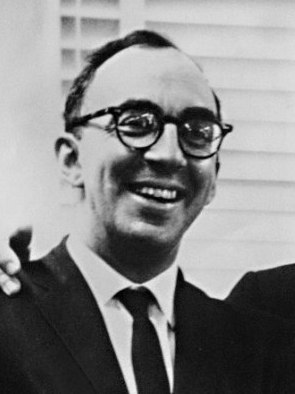News

The Man Who Gave ‘Earth Day’ Its Name
By: Reid Frazier | The Allegheny Front
Posted on:
Earth Day was the biggest environmental demonstration in history. Thousands of local volunteers made the event a success, motivated by the polluted state of the country’s shorelines, skies, and rivers.
But a clever, powerful bit of marketing played a key role in bringing in millions of people to the environmental movement. It was the name, “Earth Day.”
Though the event was the brainchild of Sen. Gaylord Nelson of Wisconsin, he didn’t come up with the name. That was the work of a legendary New York copywriter, Julian Koenig.
In the 1960s, Koenig was one of the top ad men on Madison Avenue. He came up with some of the most popular lines in the history of advertising: “Timex, it Takes a Licking and Keeps on Ticking”; “Think Small”–Volkswagen’s 1959 campaign to sell the Beetle to the American public. He was in the Copywriting Hall of Fame. Decades later, Don Draper would namedrop him on an episode of the TV show Mad Men.
A MAD MAN
Koenig was a sharp man who gave his opinions out freely, says his daughter, Sarah, a producer for This American Life and host of the hit podcast Serial.

“My dad was really very blunt and persuasive in his opinions about stuff—he had great taste, kind of beautiful taset actually and he made it clear there were good ideas, and not good ideas, and he knew what the good ideas were,” says Sarah Koenig, who produced a story about her father’s career for This American Life that first aired in 2009.
The 2009 story focused on her father’s career in advertising-and about a long feud he had with one of his partners, George Lois. The two men were partners for the Madison Avenue firm Pappert, Koenig and Lois.
Though Koenig and Lois clashed over who was responsible for some of the firm’s most significant work, noone disputed that Koenig coined ‘Earth Day’.
So how did one of the world’s great advertisers get involved with the biggest environmental demonstration in history?
Sarah Koenig says her father got interested in the environment in the 1960s. He began volunteering on conservation-related projects after her parents travelled to East Africa, where her mother was from.
“I don’t know if that was kind of an eye opening thing for him—he was a city kid from New York,” says Sarah Koenig.
After returning to the U.S., Julian Koenig did a pro-bono ad campaign to preserve the Serengeti—and started a short-lived environmental magazine.
REBRANDING A ‘TEACH-IN’
It was around this time that a group of students and conservationists were organizing a nationwide event to call attention to the environment.
At the time, organizers were calling the event an ‘environmental teach-in’, says Adam Rome, historian and author of The Genius of Earth Day.
“They all thought ‘Environmental Teach-in’ was a loser of a name, that it sounded too academic, that it didn’t sound action-oriented,” says Rome.
The event needed a tagline—a brand. Enter Julian Koenig. Koenig approached the organizers with an offer to work for free to advertise the event.
Denis Hayes was the young national director for the event, just out of college and hand-picked by Sen. Nelson to head up the organization.
“Initially we didn’t even know who he was, but did a little bit of digging, and found he was one of the real players in American advertising,” says Hayes, who runs the Bullitt Foundation, a Seattle-based environmental philanthropy.
Koenig gave the group a few choices for what to call the event.
“One of them was ‘Earth Day’, one was ‘E-Day’, one was ‘Ecology Day’. He made it clear the one he thought worked best was ‘Earth Day.’
Sarah Koenig says her father didn’t need long to figure out what was best to call the event. It was scheduled for April 22, 1970. That was his birthday.
“He would always say, ‘Earth Day, birthday. It was easy…’ and that was his entire explanation for how he came up with it…” she says.
Hayes says the name was key to being able to bring people in–the event wasn’t a debate, or a lesson. Earth Day was sticky, and wasn’t preachy.
“If you’re starting to talk about human ecosystems and biomes you relatively quickly put your audience to sleep,” Hayes says. “We needed some way to describe this that would resonate immediately, and Earth Day did accomplish that for us.”
The group placed an ad in the New York Times with a cut-out coupon for people to send back with donations. It became the rare ad that paid for itself. And it helped the event achieve a massive turnout—20 million people by most estimates from all walks of life.
“I figured ‘Oh my God – we’ve unleashed some powerful new force on American life,’” says Hayes. “And it turned out to be true.”
A few years after Earth Day, the Clean Air Act and Clean Water Act would be passed, and the Environmental Protection Agency would all be established, signed into law by President Richard Nixon.
AN AD MAN’S LEGACY
Sarah Koenig says ‘Earth Day’ was the kind of thing her father would come up with all the time.
“It’s very typical of my dad’s work, and his best work. Very spare, very smart, very classy, very simple. Simple but smart,” she says. “‘Think Small’, that’s his most famous line. It’s two words.”
For her father, his work helping invent Earth Day served as a counterbalance to some of his own negative feelings about his career in advertising.
“By a lot of people still he’s considered the best copywriter that ever lived,” she says. “He was a master at it. Obviously, he was proud of that. On other hand, (he thought) ‘I spent my life selling [expletive] to people, and he wasn’t proud of that part.”
In the 2009 story for This American Life—Koenig discussed these misgivings.
“Advertising is built on puffery—on, at heart, deception,” he said. “And I don’t think anybody can go proudly into the next world with a career built on deception—no matter how well they do it.”
In an un-aired portion of the 2009 interview with his daughter, Koenig, who passed away in 2014, at the age of 93, said he wanted Earth Day to be his legacy.
“Well, Earth Day is one of those things when my children say, ‘What did you do in the Great War, Grandpa?’ I’ll say ‘Well, I wrote “Timex, it takes a licking and keeps on ticking,” I wrote “Think Small,” the first Volkswagen advertising, and I named Earth Day.’”

